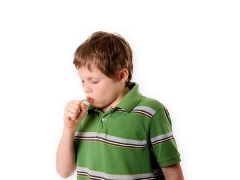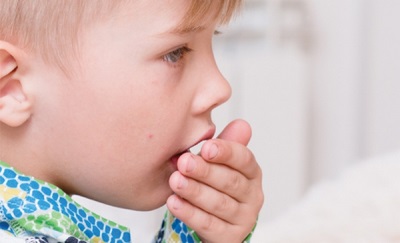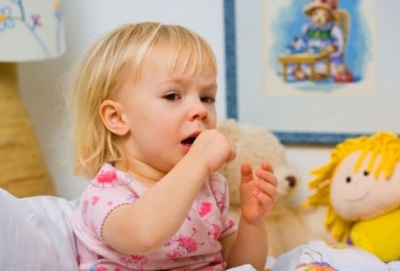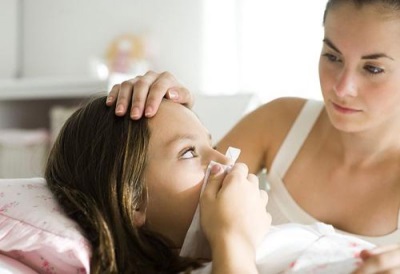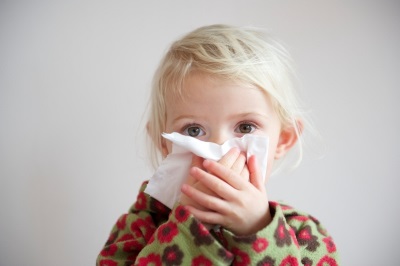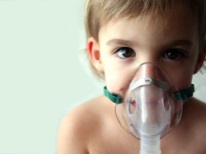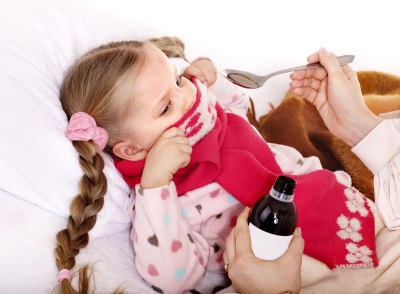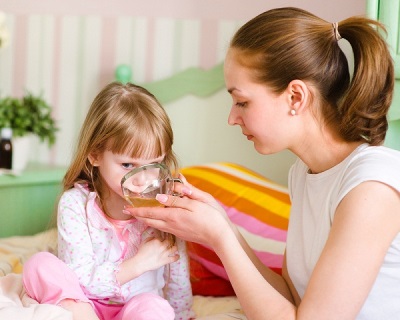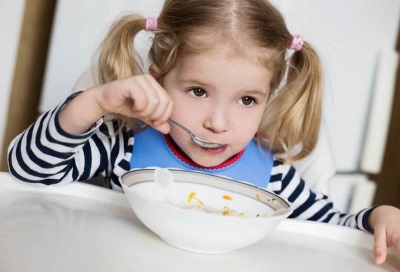How and how to treat a barking cough in a child?
When a child has a loud, painful cough, all parents seek to help the crumbs as quickly as possible. To do this, you need to understand why there was a cough, how to cope with an attack and what treatment is most effective.
Signs and symptoms: how to recognize a barking cough?
A loud, barking sound occurs when you cough, causing airway lesions affecting the larynx and vocal cords. Cough, which sounds like a dog barking, is more common at the age of 5 years. This is due to a narrower larynx and easier appearance of edema. It is dry and rather painful for a child, and at night it can be combined with difficulty breathing.
In addition to coughing a baby can be observed:
- Increased temperature.
- Sore feeling and tingling sensation in the throat.
- Hoarse voice or hoarseness.
- Whistling while inhaling.
- Weakness.
- Dyspnea.
- Pallor.
- Decreased appetite.
- Runny nose
- Nausea.
- Swollen lymph nodes.
The reasons
The appearance of cough, which is called barking, is usually associated with colds, viral and bacterial infectious diseases. Also this type of cough has an allergic nature.
Among the diseases whose symptom is a barking cough include:
- Laryngitis
- Pharyngitis
- Influenza and other viral infections of the respiratory tract
- Diphtheria
- Whooping cough
- Allergic airway damage
- Foreign body in the larynx
- Nerve lesions, burns or neoplasms.
Barking cough with fever
The combination of such symptoms appears in viral and bacterial infections affecting the larynx and trachea. The temperature may rise strongly or remain subfebrile. At the same time, there are other signs of intoxication, for example, fatigue, decreased appetite, weakness, loss of body weight. A child with such symptoms needs medical help and, with proper treatment, his condition will improve in a few days.
No temperature
The most common cause of loud barking cough, in which body temperature does not change, is an allergy. At the same time, along with cough, the child may have tearing, runny nose, itching and redness of the skin.
A prolonged barking cough for 4-6 weeks without a change in body temperature is also characteristic of paracoclusum. This bacterial infection affects the mucosa of the respiratory tract and irritates it, which leads to the appearance of unproductive cough and edema.
What is dangerous?
Diseases that manifest as a strong, loud cough called barking can cause such complications as:
- The development of false croup.
- The appearance of respiratory failure.
- The development of asthma.
For information on how to understand laryngitis or croup in a child, see the transfer of Dr. Komarovsky.
How to treat?
In treating a baby with a barking cough, use is made of:
- Steam inhalation. They help reduce laryngeal edema, moisturize and soften the mucous. For such inhalations, you can use the usual pan, which contains a boiling liquid (water with salt, herbal decoction, boiled potatoes), as well as apply a steam inhaler. You can fill the bathroom with boiling water and periodically bring the child into it for a few minutes.
- Nebulizing inhalation. For such procedures, a special apparatus is needed that converts the liquid into the smallest particles entering the respiratory tract. For babies with a barking cough in a nebulizer, it is recommended to pour mineral water and saline. For one procedure, use 3-4 ml of fluid.
- Drug treatment. It must be prescribed by a doctor, because some drugs may worsen the child’s condition, and self-prescription may not take into account possible contraindications.
- Distracting procedures. If the body temperature is not elevated, a child can have a warm foot bath or rub the legs with warming agents.
Effective drugs
In the case of a barking cough, the doctor may prescribe such drugs to the child:
- Antihistamines to reduce swelling and calm the baby, for example, Claritin, Tsetrin, Zyrtec or suprastin.
- Antipyretic if cough is combined with fever, for example, Paracetamol or Nurofen.
- Antitussive in case of severe, painful dry cough, for example, Codelac, Paxeladin, Sinekod or Libexin.
- Expectorants when a cough begins to cough off viscous sputum, for example, Herbion, Lasolvan, Gedelix, Dr. Theiss, Althea Syrup or Mukaltin.
- Antibioticsif the cause of the disease is a bacterial infection.
Aggravations at night
At night, the cough in many children is exacerbated, because the lungs are ventilated during sleep and are supplied with blood worse, and the sputum stagnates and becomes thicker. Such a cough makes the baby wake up and cough for a long time, while the baby’s breath can become whistling, which requires the immediate intervention of doctors.
Remember that a night coughing attack, during which the child suffocates, is a reason to call an ambulance for the child.
How to help with a coughing fit?
- Distract the baby and calm him down.
- Empty his chest by wearing loose clothing.
- Give plenty of warm drink.
- Moisten the air in the room.
Treatment according to Komarovsky
When a barking cough appears, a well-known pediatrician advises you to immediately consult a doctor, since such a symptom during the daytime can mean a high risk of seizures at night. An independent appointment to the child of any medication Komarovsky does not welcome. According to the popular pediatrician, parents on their own initiative should only humidify the air in the room and give the kid to drink plenty of warm liquid, because these measures are very simple and accessible to every mother, but they are effective enough to fight dry cough. Komarovsky advises any medications to be given only as prescribed by the pediatrician.
Diet therapy
Eating a child with a barking cough should be gentle to the throat, so do not give your baby neither excessively cold foods nor too hot dishes. Try to ensure that all important nutrients and vitamins enter the children's body. Let the food be light and nutritious, and if the baby refuses to eat, he should not be forced. Greater emphasis should be placed on warm drinking, giving the crumbs a lot of tea, herbal decoctions, fruit drinks, fruit juice, and milk.
What should be alerted?
Parents need to seek medical help if their child:
- The voice has changed.
- Very high body temperature.
- Appeared cyanosis of the skin.
- Increased saliva secretion.
- Difficulty in swallowing.
- Difficulty breathing began.
- There was diarrhea.
- There was a swoon.
For more information about the barking cough, see the program "Live healthy" about whooping cough.
Tips
- It is important to calm the child with a barking cough, because anxiety only intensifies the cough and reduces the muscles of the larynx. It is also important to calm down and parents so that their anxiety is not transmitted to the baby.
- Provide the ill child with optimum conditions of stay. The room should be ventilated and cleaned regularly, and the air in it should be sufficiently humid. It is recommended to use a humidifier, but you can also arrange the containers filled with water in the room or hang out a wet cloth.
- When the cough has become productive, the child can perform a drainage massage. This will help get rid of sputum faster and speed recovery.
For more information on the barking cough with parakoklyushe see in the program "To live is great."
